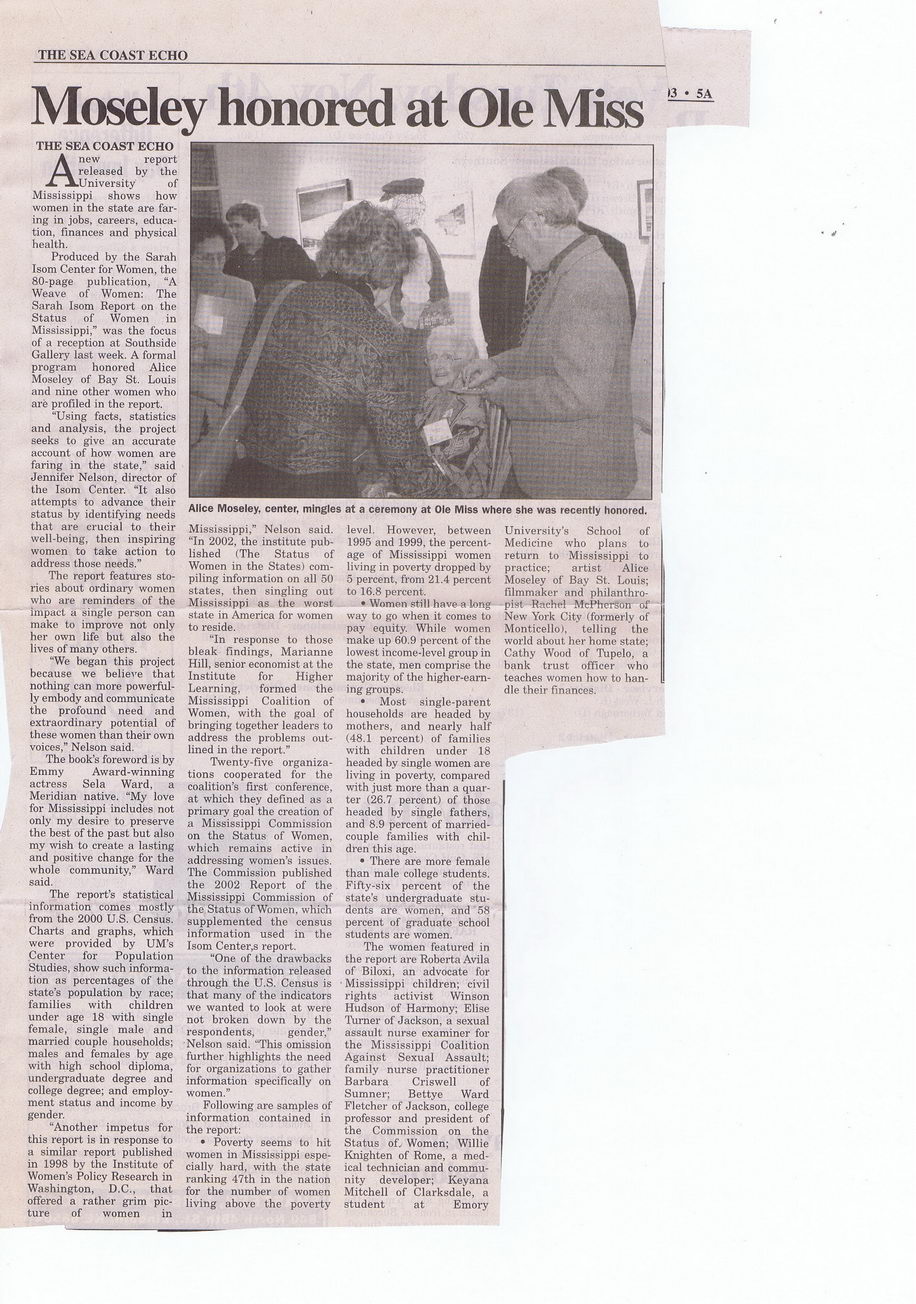This text was obtained via automated optical character recognition.
It has not been edited and may therefore contain several errors.
THE SEA COAST ECHO Moseley honored at Ole Miss )3 ? 5A THE SEA COAST ECHO Anew report released by the University of Mississippi shows how women in the state are faring in jobs, careers, education, finances and physical health. Produced by the Sarah Isom Center for Women, the 80-page publication, ?A Weave of Women: The Sarah Isom Report on the Status of Women in Mississippi,? was the focus of a reception at Southside Gallery last week. A formal program honored Alice Moseley of Bay St. Louis and nine other women who are profiled in the report. ?Using facts, statistics and analysis, the project seeks to give an accurate account of how women are faring in the state,? said Jennifer Nelson, director of the Isom Center. ?It also attempts to advance their status by identifying needs that are crucial to their well-being, then inspiring women to take action to address those needs.? The report features stories about ordinary women who are reminders of the impact a single person can make to improve not only her own life but also the lives of many others. ?We began this project because we believe that nothing can more powerfully embody and communicate the profound need and extraordinary potential of these women than their own voices,? Nelson said. The book?s foreword is by Emmy Award-winning actress Sela Ward, a Meridian native. ?My love for Mississippi includes not only my desire to preserve the best of the past but also my wish to create a lasting and positive change for the whole community,? Ward said. The report?s statistical information comes mostly from the 2000 U.S. Census. Charts and graphs, which were provided by UM?s Center for Population Studies, show such information as percentages of the state?s population by race; families with children under age 18 with single female, single male and married couple households; males and females by age with high school diploma, undergraduate degree and college degree; and employment status and income by gender. ?Another impetus for this report is in response to a similar report published in 1998 by the Institute of Women?s Policy Research in Washington, D.C., that offered a rather grim picture of women in Alice Moseley, center, mingles at a ceremony at Ole Miss where she was recently honored. Mississippi,? Nelson said. ?In 2002, the institute published (The Status of Women in the States) compiling information on all 50 states, then singling out Mississippi as the worst state in America for women to reside. ?In response to those bleak findings, Marianne Hill, senior economist at the Institute for Higher Learning, formed the Mississippi Coalition of Women, with the goal of bringing together leaders to address the problems outlined in the report.? Twenty-five organizations cooperated for the coalition?s first conference, at which they defined as a primary goal the creation of a Mississippi Commission on the Status of Women, which remains active in addressing women?s issues. The Commission published the 2002 Report of the Mississippi Commission of the Status of Women, which supplemented the census information used in the Isom Center,s report. ?One of the drawbacks to the information released through the U.S. Census is that many of the indicators we wanted to look at were not broken down by the respondents, gender,? Nelson said. ?This omission further highlights the need for organizations to gather information specifically on women.? Following are samples of information contained in the report: ? Poverty seems to hit women in Mississippi especially hard, with the state ranking 47th in the nation for the number of women living above the poverty level. However, between 1995 and 1999, the percentage of Mississippi women living in poverty dropped by 5 percent, from 21.4 percent to 16.8 percent. ? Women still have a long way to go when it comes to pay equity. While women make up 60.9 percent of the lowest income-level group in the state, men comprise the majority of the higher-earning groups. ? Most single-parent households are headed by mothers, and nearly half (48.1 percent) of families with children under 18 headed by single women are living in poverty, compared with just more than a quarter (26.7 percent) of those headed by single fathers, and 8.9 percent of married-couple families with children this age. ? There are more female than male college students. Fifty-six percent of the state?s undergraduate students are women, and 58 percent of graduate school students are women. The women featured in the report are Roberta Avila of Biloxi, an advocate for Mississippi children; civil rights activist Winson Hudson of Harmony; Elise Turner of Jackson, a sexual assault nurse examiner for the Mississippi Coalition Against Sexual Assault; family nurse practitioner Barbara Criswell of Sumner; Bettye Ward Fletcher of Jackson, college professor and president of the Commission on the Status of. Women; Willie Knighten of Rome, a medical technician and community developer; Keyana Mitchell of Clarksdale, a student at Emory University?s School of Medicine who plans to return to Mississippi to practice; artist Alice Moseley of Bay St. Louis; filmmaker and philanthropist -Rachel McPherson of New York City (formerly of Monticello), telling the world about her home state; Cathy Wood of Tupelo, a bank trust officer who teaches women how to handle their finances.

Moseley, Alice Moseley-honored-at-Ole-Miss-Sea-Coast-Echo-Thursday-October-23-2003